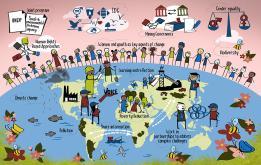The Young Environmental Journalists programme aims to provide learning and networking opportunities to outstanding young journalists, students and environmental defenders. The campaign is facilitated by the joint Swedish Environmental Protection Agency (EPA) - UN Development Programme Environmental Governance Programme, UN Volunteers (UNV) programme and the UN Institute for Training and Research (UNITAR). The Environmental Governance Programme is fully funded by the Swedish International Development Cooperation Agency.
UNDP advertised for the Young Environmental Journalists via the Online Volunteering platform of UNV, offering young leaders and environmental and human rights advocates worldwide an opportunity to join the programme. Following a rigorous selection process, 71 young talents were selected to work together in 2019, while 100 young talents from 27 countries participated in the 2020 edition of the campaign.
The 2020 edition of the campaign focused on improving environmental and human rights protection in the mining sector in four resource-rich countries: Colombia, Kenya, Mongolia and Mozambique. The campaign offered online-based learning courses, networking activities and presentations by renowned journalists, guest speakers and experts.
My aim throughout this project is to contribute to making visible sustainable development initiatives that enhance local community empowerment and horizontal collaboration. --Nicolas Lara, Young Environmental Journalist in the Colombia group
The Young Environmental Journalists produced inspiring stories and videos on the environment and human rights, and on their experiences as part of the programme.
In Kenya, tensions between youth activists and the mining industry have been raised as the activists are taking action against the environmental degradation caused by the industries. In the article Growing Youth Activism for Environmental Protection in Africa, which the Young Environmental Journalists of the Kenya group published, the team highlights how the young environmental activists are finding ways for a more sustainable and just society. Along with this, Kevin Lunzalu (Kenya Group) shared his experience in shaping public awareness and national policies through environmental journalism.
I am an enthusiastic sustainability champion. Joining the Young Environmental Journalists is indeed an opportunity to contribute in shaping environmental sustainability and tackling the salient issues around environment and human rights in the mining sector. --Brian Owino, Young Environmental Journalist in the Kenya group
Similarly, in Mozambique, wood burning for charcoal production has led to high rates of deforestation. The Young Environmental Journalists from the Mozambique group cover the environmental situation in the province of Gaza and share how some organizations respond to the issue at the community level.
Being part of the Young Environmental Journalist campaign is an opportunity to contribute and make an impact in achieving the SDG No. 11 for sustainable environment by rendering quality research and information that will serve as an edge for awareness not only to the Mozambican community but also to the world concerning environmental issues and how best we can do something better towards a sustainable future. --Sandra Johnson, Young Environmental Journalist in the Mozambique group
On the other hand, more than 70 per cent of its surface is affected by land degradation in Mongolia, especially from mining activities. In the article Curbing Land Degradation & Protecting the Environment in Mongolia, the Mongolia team highlights how different stakeholders are coming together to work towards restoring and rehabilitating the land.
Amidst these unprecedented times, any small move to help can impact greatly. To me, volunteering is invigorating and this collaborative project with UNDP and the Swedish Environmental Protection Agency could genuinely succor people in the long run. --Srivani Bairi, Young Environmental Journalist from India in the Mongolia group
Among the many topics covered during the 2020 edition of the campaign was the global supply chains of green conflict minerals, including anti-corruption efforts in mining governance, sustainable & responsible consumption, and new trends and forces shaping consumer demand. The campaign also explored the right to a healthy environment, with a focus on youth activism in environmental and biodiversity protection and community-based/participatory environmental monitoring of mining projects.
The learning process was broken down into five phases:
1. Environment, biodiversity and human rights in the mining sector (14-28 September 2020) enabled Young Environmental Journalists to identify key environmental and human rights impacts caused by mining activities, interpret the main international conventions and frameworks related to environmental and human rights protection, and understand ongoing efforts and challenges related to the realization of the right to a healthy environment.
2. Storytelling and investigative journalism (29 September - 8 October 2020) imparted the basic principles of storytelling and some of the complexities and risks faced by investigative journalists covering environmental and human rights issues in the mining sector.
3. Global mineral supply chains (9-22 October 2020) elaborated the basic principles and conceptual frameworks applied to map global supply chains of green conflict minerals, as well as initiatives related to combating corruption in global mineral supply chains.
4. New trends and forces in sustainable consumption and consumer awareness in Colombia, Kenya, Mongolia, Mozambique and Sweden (23 October - 12 November 2020) outlined the underlying principles and the historical context of the Agenda 2030 and the Sustainable Development Goals, with a special focus on SDG 12, Sustainable Consumption and Production, and on the UN Environment Resolution on mineral resource governance and the SDGs, adopted in March 2019.
5. Youth activism and engagement in environmental and human rights issues in Colombia, Kenya, Mongolia, Mozambique and Sweden (13 November – 14 December 2020) presented UNDP’s approach to youth empowerment and the role of the youth in realizing the aspirations and objectives of the Agenda 2030 for Sustainable Development.

